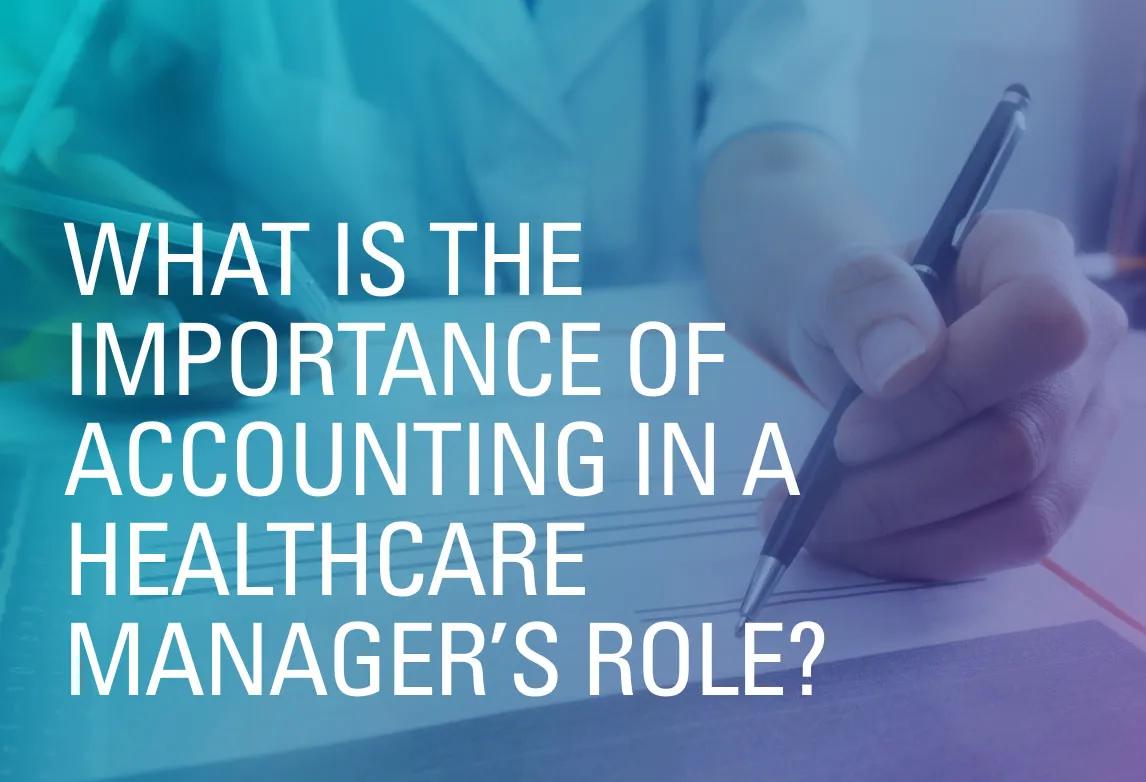What is the Importance of Accounting for Healthcare?

Those who perform processes within a healthcare setting or function perform several duties designed to help healthcare organizations run effectively and efficiently.
These duties can often benefit from education in healthcare accounting. Why is knowledge in effective accounting methods, theories, practices, and procedures so important to those performing healthcare processes? For starters, it can impact a healthcare facility’s day-to-day operations.
Day-to-Day Operational Impacts of Effective Healthcare Accounting Practices
Imagine that you’re working in a hospital and a patient comes in with a gash on her leg. It’s not deep enough for stitches, but you do need to clean the wound and bandage it up to keep it from getting infected. So, you go to the supply closet to get all of the items you need. However, upon opening the door, you see that the shelves are bare. There are no cleaning solutions or gauze anywhere to be found. Would this impact your ability to do your job? Of course, the answer is yes.
If you don’t have the physical items you need to tend to your patients, your healthcare facility won’t be able to provide even the simplest level of care. While this relies in part on ensuring that all necessary items are always fully stocked, you won’t have them at all if they’re not provided for in the agency’s budget. The ability to perform this function effectively can majorly impact the day-to-day operations of these facilities.
Furthermore, preparing and monitoring a healthcare organization’s budget goes beyond having the necessary supplies and can also include how much a certain department has to spend on adequate staffing, state-of-the-art equipment, and more. Therefore, if a proper budget is not planned and maintained, each of these areas can be impacted. Ultimately, this can also impact patient satisfaction, causing them to go elsewhere for their necessary healthcare services.
For example, the American Academy of Family Physicians reports that one of the key factors that affects whether a patient is satisfied with an interaction with a healthcare provider is the amount of time spent with that provider. Specifically, the more time the patient is able to spend with the practitioner, the more satisfied the patient is with the visit.
Let’s say that, as a healthcare manager, you only budgeted for two healthcare providers on staff when you could really use three due to the number of people who walk in through your door on an average day. By making patients wait longer periods of time for services, you’re potentially lowering the satisfaction with the visit.
The reason this matters is because research has found that patient satisfaction levels impact how well patients do with their treatments (their outcomes) and whether they continue with their recommended treatment plans. Patient satisfaction level even impacts whether a patient may decide to file a medical malpractice claim. In this way, setting a proper budget can not only potentially keep the healthcare facility out of court, but it can also help improve patient’s health and wellness at the same time.
What Is Revenue Cycle Management?
Another reason accounting is important in a healthcare role is because paying adequate attention to the company’s finances impacts the life of the business. Put another way, if a healthcare organization or agency doesn’t adequately monitor money coming in versus money going out and set a budget for specific expenses, it may not be in business for long.
Though healthcare professionals are ultimately in the business of saving lives, at the end of the day, they are still businesses. Therefore, they rely on a process called revenue cycle management.
The Healthcare Business Management Association (HBMA) explains that revenue cycle management, or RCM as it is often referred to in short, “is the administration of financial transactions that result from the medical encounters between a patient and a provider, facility, and/or supplier.” The HBMA further adds that these transactions include everything from payment billing and collections to data coding, analytics, and compliance.
To make this concept easier to understand, imagine that you own a store that sells furniture. To stay in business, you need to make sales, right? By default, then, you need to develop a way to create invoices for the items your customers want to purchase. You also need a system in place to collect their payments, as well to pursue any monies that are past due if they don’t pay as promised. However, your revenue-related needs don’t stop there.
If you don’t have the materials to manufacture your furniture, you won’t have anything to sell. Thus, you’ll also need a way to effectively communicate with your suppliers, ensuring that you are able to order all the parts and pieces you need to make your goods. This means providing the correct codes for the products you need so you always get the right ones.
On top of that, you’ll also have to account for all your day-to-day business expenses, such as your rent or mortgage, electric bill, gas payments, phone charges, and internet. Basically, any money that is coming in or going out of your business needs to be kept track of so you can be assured to have enough cash to keep your doors open.
All of this is part of revenue cycle management. It involves developing a process or set of processes for anything that is related to the finances of your business, such as invoicing and billing, accounts receivable, and recording of expense-related payments.
Now, transfer these same types of needs to healthcare facilities. These facilities need a way to invoice patients for services rendered and to collect monies due.
And, like other businesses, healthcare facilities also have day-to-day expenses related to utilities, payroll, supplies, and everything else required to provide efficient patient services. This is where bookkeepers and accountants come into play.
These professionals are often tasked with helping the healthcare facility keep track of and better manage its incoming and outgoing transactions, ensuring that the revenue cycle is properly managed from the first interaction with the patient until the final payment is made in full.
Proper Accounting Impacts the Life of the Facility
The Healthcare Financial Management Association indicates that roughly $400 billion of the country’s $2.7 trillion dollars spent annually on healthcare “goes to claims processing, payments, billing, revenue cycle management, and bad debt, partially due to the inefficiency of payer-provider transactions.” Thus, a healthcare accounting professional can help reduce these types of costs—therefore improving the organization’s bottom line—by creating an effective payment collections process.
A healthcare facility’s or function’s finances involves paying attention to patient billings to ensure the accounts are being paid in full and within a reasonable amount of time. With this in mind, some of the questions healthcare accounting professionals may ask could include:
- How many patients currently have outstanding balances on their accounts?
- What is the average balance amount due per patient?
- What is the total amount due in outstanding patient balances?
- How are we notifying patients of the monies they owe?
- How long does it typically take a patient to pay after notice is sent?
- What methods of payment are used most? Is there a cost to use these? If so, what is it?
All these questions can help them better determine whether the company has an effective payment collection process or if that process needs to be revised or reviewed so the organization continues to bring in enough revenue to support it long-term.
Effective Accounting Practices Improves Compliance with Regulatory Agencies
Those who are proficient in accounting can also help ensure their office’s or facility’s compliance with any requirements as set forth by regulatory agencies.
As a healthcare accountant for a hospital then, it is your responsibility to know these requirements. It also may be your responsibility to assist in the accurate completion of required forms so your agency is in full compliance with the IRS’s mandates. If these forms are not filed correctly or contain incorrect information, it can hurt a healthcare organization financially.
Case in point: for returns filed in 2020, businesses earning more than $5 million dollars annually that are also filing within 30 days of the filing due date face a penalty of $50 per incorrect return or statement, up to a maximum of $556,500 according to the IRS. Additionally, if these incorrect returns or statements are received after August 1st, the maximum penalty increases to more than $3.3 million.
And if the IRS feels that your healthcare facility is intentionally disregarding these corrections, there is no limitation on the amount of penalty that can be assessed by the IRS. Even businesses with gross receipts under $5 million can be assessed penalties exceeding $1 million, so it’s important for healthcare professionals to know how to avoid these types of situations.
Good Bookkeeping and Accounting Practices Means Fewer Errors
Once you understand these financial and compliance requirements, it becomes easier to see why bookkeeping and accounting play such a critical role for healthcare facilities. If these facilities do not pay attention to their numbers and always know where they stand financially, they won’t be open long enough to actually help their patients.
But good bookkeeping and accounting practices offer another advantage as well: fewer errors.
If you’ve ever forgotten to record a payment you made from your checking account, you’ve already experienced the angst that having erroneous accounts can cause. On a personal level, they can lead to overdraft charges, utilities being shut down short-term, and a little bit of shame as you call your creditors and explain what happened. However, for a business, the impact can be much worse.
If a healthcare facility is not keeping accurate track of its monies coming in versus your monies going out, causing the gas or electric company to stop service, patients aren’t going to be happy. If patients aren’t happy, they aren’t going to return.
Worse yet, if the errors cause the facility’s administrators to make the wrong decision, it may have to answer to the shareholders as well. This can quickly take the situation from bad to worse.
Thus, hiring someone to keep accurate books and maintain sound accounting practices decreases the likelihood that a healthcare entity will have to deal with these types of situations.
This is especially important when dealing with patient health and patient satisfaction.
Playing a Role in Patient Satisfaction
Another reason bookkeeping and accounting are important in healthcare is because the manner in which the facility is run can either positively or negatively impact patient satisfaction.
When a healthcare business establishes effective bookkeeping and financial recording processes, patients’ payments are handled in a timely and professional manner, meeting their expectations. This keeps positive dialogue open with the patient because there are fewer issues or concerns, impacting the positive communication factor as well.
On the surface, increased satisfaction means that the patient is more likely to continue to choose that specific healthcare facility or provider. They may even refer their friends, helping the healthcare facility grow.
Since bookkeeping and accounting practices support and contribute to the provider-patient interaction, these practices can have an indirect impact on patient satisfaction levels. They can either further that satisfaction or they can hinder it.
Think back to a time when you have dealt with a healthcare company. If that company had an efficient payment and billing process, how did that make you feel? Conversely, if their process was disorganized and difficult to work with, how did you feel then?
While bookkeeping and accounting processes may seem unimportant, mainly because they are done behind the scenes, your own interactions with healthcare companies highlight how their efficiency ultimately affects your experience, thus impacting these other factors as well.
Career Training for Effective Healthcare Accounting Practices
If you’re interested in providing accounting services within the healthcare field, Ultimate Medical Academy (UMA) offers a Healthcare Accounting Associate Degree program that can help get you started in your pursuit.
Contact UMA today to learn more about our Healthcare Accounting Associate Degree program. Our knowledgeable and helpful staff is here to answer any questions you may have, as well as to assist you with selecting the right healthcare career training program for you!
Disclaimer: UMA’s Healthcare Accounting program does not prepare students to become certified public accountants or to take the Certified Public Accountant exam, but to work in the field as a healthcare accounting clerk or bookkeeper. The information provided here is aimed at providing information necessary to make an informed decision regarding a future in healthcare accounting. To learn more about how we can help you or the programs we have to offer, contact us today!
Request Information
Talk with us. Start your journey.
Complete this form and we'll call you to explore options at UMA and answer your questions. We'll also email you info on how to get started. We're with you at every step!
Request Information
Talk with us. Start your journey.
Complete this form and we'll call you to explore options at UMA and answer your questions. We'll also email you info on how to get started. We're with you at every step!
About the Author
 Adam Fenster
Adam FensterAdam Fenster is a senior copywriter at Ultimate Medical Academy, with journalism experience from his time as a reporter and editor for multiple online and print publications. Adam has been covering healthcare education since 2019, with an emphasis on topics such as wellness, healthcare employment, and job preparedness. He received his BA in journalism from the University of South Florida.
Related Content


